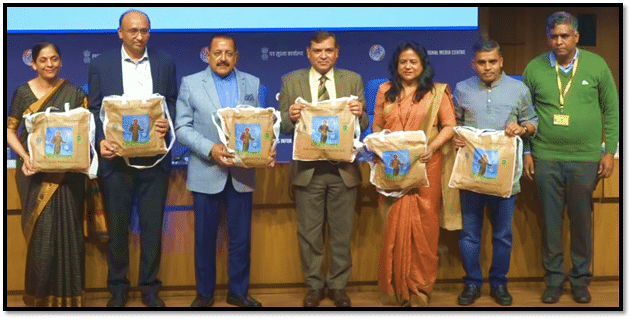Kisan Kavach: A Revolutionary Step for Farmers’ Safety

In the agricultural heartland of India, farmers face numerous challenges, one of which is the harmful effects of pesticides. Preetam Singh, a farmer from Panipat, Haryana, has voiced these concerns, highlighting the health risks associated with pesticide use. While pesticides are essential for protecting crops from pests and diseases, they can also pose significant dangers to those who handle them. In response to these pressing issues, the launch of Kisan Kavach, a protective suit designed specifically for farmers, marks a significant advancement in agricultural safety. This innovative solution allows farmers like Preetam to apply pesticides with confidence, knowing their health is safeguarded.
Kisan Kavach: Unveiling the Safety Shield
On December 17, Union Minister Dr. Jitendra Singh officially unveiled Kisan Kavach, India’s first anti-pesticide bodysuit. This groundbreaking innovation aims to protect farmers from the harmful effects of pesticide exposure. The launch event was not just a formality; it symbolized a major step forward in ensuring the safety of the agricultural community through the application of science and technology. During the event, the first batch of Kisan Kavach suits was distributed to farmers, emphasizing the government’s commitment to safeguarding those who feed the nation.
The Kisan Kavach suit is designed to provide comprehensive protection. It includes a full-body suit, mask, headshield, and gloves, ensuring that farmers are shielded from pesticide exposure during application. This initiative is particularly crucial given the rising concerns about pesticide-related health issues. By equipping farmers with this protective gear, the government aims to empower them and enhance their safety while working in the fields.
Using Innovation to Safeguard Farmers’ Health
Kisan Kavach represents a significant leap in agricultural safety technology. Developed by BRIC-inStem in Bangalore in collaboration with Sepio Health Pvt. Ltd., this bodysuit addresses a critical safety concern for farmers. The suit is not only innovative but also practical. Priced at ₹4,000, it is washable, reusable, and designed to last up to two years, even with frequent washing.
The advanced fabric technology used in Kisan Kavach is a game-changer. It deactivates harmful pesticides upon contact, ensuring maximum safety for farmers. The fabric employs a unique process where a nucleophile is covalently attached to cotton fibers, allowing it to neutralize pesticides through nucleophilic-mediated hydrolysis. This innovative approach has been detailed in the journal Nature Communications, showcasing the scientific rigor behind the product. The government plans to reduce the cost of the suit over time, making it more accessible to a broader audience, thereby enhancing the safety of more farmers across the country.
Pesticides: A Double-Edged Sword
Pesticides play a crucial role in modern agriculture, especially in a country like India, where food production must keep pace with a growing population. However, their use comes with significant risks. Crop pests and pathogens can cause yield losses of 15–25% in major crops, making pesticides essential for maintaining agricultural productivity. Yet, when misused, pesticides can have dire consequences for both human health and the environment.
Improper handling and application of pesticides can lead to severe health risks. Farmers are particularly vulnerable during the mixing and spraying processes, where exposure is heightened. Pesticides can enter the body through the skin, eyes, mouth, or lungs, with skin contact being especially dangerous. Between 2015 and 2018, misuse of pesticides resulted in 442 fatalities, underscoring the urgent need for protective measures like Kisan Kavach.
The government has recognized these challenges and is actively working to mitigate the risks associated with pesticide use. By promoting safer practices and providing protective gear, initiatives like Kisan Kavach aim to create a safer working environment for farmers, ensuring that they can continue to produce food without compromising their health.
Reducing Pesticide Usage: Key Government Strategies
The Indian government has taken significant steps to address the risks associated with pesticide use. The severity of these risks became evident in 1958, leading to the enforcement of the Insecticides Act, 1968, and the Insecticide Rules, 1971. These regulations aimed to control the import, manufacture, sale, and use of insecticides, ensuring the protection of human and animal health. Key provisions include mandatory product registration and the establishment of the Central Insecticides Board (CIB) for technical guidance.
In addition to regulatory measures, the government promotes Good Agricultural Practices (GAP) to ensure sustainability in farming. GAP focuses on economic viability, environmental sustainability, social acceptability, and food safety. By encouraging farmers to adopt these practices, the government aims to enhance the quality of agricultural products while ensuring the safety of farmers and consumers alike.
Furthermore, the promotion of biopesticides is a crucial aspect of reducing chemical pesticide usage. The Central Insecticide Board & Registration Committee (CIB&RC) has simplified the registration process for biopesticides, making it easier for farmers to access safer alternatives. By fostering the use of biopesticides and organic farming practices, the government is taking significant steps toward creating a more sustainable agricultural landscape in India.
Observer Voice is the one stop site for National, International news, Sports, Editor’s Choice, Art/culture contents, Quotes and much more. We also cover historical contents. Historical contents includes World History, Indian History, and what happened today. The website also covers Entertainment across the India and World.
Follow Us on Twitter, Instagram, Facebook, & LinkedIn

